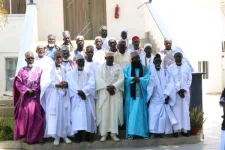A human rights group slammed the formation of a National Muslim Elders Council, questioning whether it legally exists. President Adama Barrow launched this council last Friday, calling it important for peace. He named himself patron, promising office space, a bank account, vehicle, and monthly fuel.
Barrow asked council members to pray for national stability, saying development needs peace. The new body includes 17 executives and 87 regional members. Its president, Muhammed Lamin Touray, stated they want to work with the Supreme Islamic Council and other Muslim groups supporting presidential development efforts. The council aims to advise on religious matters and strengthen relationships between religious institutions.
The Edward Francis Small Center for Rights and Justice strongly objected. They argued that the president cannot create public offices without constitutional backing or parliamentary approval. They questioned how this body would be funded, noting that the president told members not to worry about resources. The center believes that creating such a council requires legislation through the National Assembly, if needed at all.
The group further claimed that no religious tensions exist in The Gambia needing such a council. They pointed out existing organizations like the Gambia Supreme Islamic Council and Gambia Christian Council already provide religious guidance without costing taxpayers money. Religious leaders already offer advice through sermons every week.
Barrow asked council members to pray for national stability, saying development needs peace. The new body includes 17 executives and 87 regional members. Its president, Muhammed Lamin Touray, stated they want to work with the Supreme Islamic Council and other Muslim groups supporting presidential development efforts. The council aims to advise on religious matters and strengthen relationships between religious institutions.
The Edward Francis Small Center for Rights and Justice strongly objected. They argued that the president cannot create public offices without constitutional backing or parliamentary approval. They questioned how this body would be funded, noting that the president told members not to worry about resources. The center believes that creating such a council requires legislation through the National Assembly, if needed at all.
The group further claimed that no religious tensions exist in The Gambia needing such a council. They pointed out existing organizations like the Gambia Supreme Islamic Council and Gambia Christian Council already provide religious guidance without costing taxpayers money. Religious leaders already offer advice through sermons every week.












